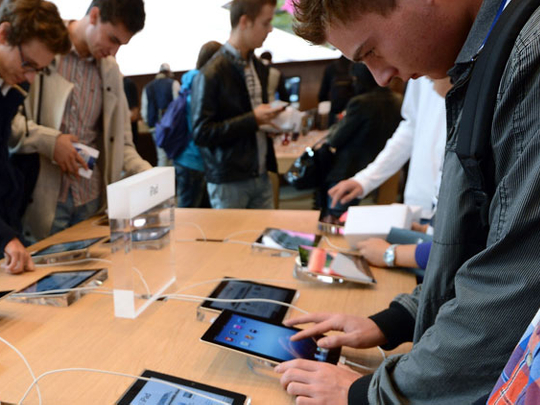
Apple won a round of a US International Trade Commission case brought by Samsung Electronics Co over patented technology in the iPhone and iPad tablet computer, its second US legal victory in a month over its largest smartphone competitor.
Apple didn’t violate Samsung’s patent rights, ITC Judge James Gildea said in a notice posted today on the agency’s website. The judge’s findings are subject to review by the full commission, which has the power to block imports of products that infringe US patents.
The judge’s findings follow a federal jury’s ruling in San Jose, California, on August 24 awarding Apple more than $1 billion in damages, after deciding that Samsung copies the look and some features of the iPhone. The California jury rejected claims that Apple infringed other Samsung patents.
“Apple at the ITC is bulletproof,” said Rodney Sweetland, a lawyer at Duane Morris in Washington, who specialises in trade cases. “Nobody can get any traction against them there. The lesson is, if you want to get relief against Apple, it’s going to have to be in a foreign forum where it doesn’t have the clout or the cachet it has at the ITC or the northern district of California.”
Gildea said there was no infringement of any of the four patents in the ITC case, and also determined that Samsung had not proven it had a domestic industry that used the patents, a requirement that is unique to the trade agency. The judge didn’t provide the reasons behind his findings. The opinion will become public after both sides get a chance to redact confidential information.
“We remain confident that the full commission will ultimately reach a final determination that affirms our position that Apple must be held accountable for free-riding on our technological innovations,” said Adam Yates, a Samsung spokesman. “We are proud of our long history of innovation in the mobile industry and will continue to defend our intellectual property rights.”
Kristin Huguet, a spokeswoman for Apple, said the company had no comment.
Apple has previously won cases brought against it at the trade agency by HTC Corp and Google Inc’s Motorola Mobility, two other manufacturers of phones that run on Google’s Android operating system. Apple lost its case against Motorola Mobility but won an order that forced HTC to remove a feature from its phones.
Apple, based in Cupertino, California, has its own ITC complaint pending against Samsung and the judge in that case is scheduled to release his findings on October 19. The two companies, which together make about half the smartphones sold in the world, are embroiled in more than 30 lawsuits spanning four continents.
“From a corporate perspective, Samsung needs to get an upper hand and they need to bring their A game,” said Will Stofega, programme director at researcher IDC. “There are a lot of things that they have going for them. They are a very valid and creative company.”
Each company is citing patented inventions to claim its products are better, while labeling its competitor as a copycat. They want to grab a greater share of a market that Bloomberg Industries said grew 62 per cent to $219 billion last year. Samsung is the world’s largest maker of smartphones while Apple dominates in the US.
The iPhone generated $16.2 billion in sales for the quarter ending June 30, about 46 per cent of Apple’s total revenue, according to data compiled by Bloomberg. Apple introduced a newer version of the iPhone on September 12 that has a bigger screen, faster chip and access to speedier wireless networks.
The phone is assembled in China by Foxconn Technology Co. The iPad garnered $9.2 billion and the iPod brought in $1 billion.
South Korea-based Samsung filed the trade complaint in June 2011, claiming Apple devices - including the iPhone, iPad tablet computer and iPod touch media player - have infringed as many as four patents.
Two of the Samsung patents cover technology used in industry-wide standards for the transmission of data. The other two are for device features - one to detect phone numbers in an e-mail or web page, and another in which the document display page moves with the user’s finger.
Samsung has about 140,000 patents worldwide on things like light-emitting diodes, computer-memory chips and televisions. It’s been in the mobile-phone market since the 1980s and is counting on that history to get an upper hand in its global fight with Apple.
The company makes the microprocessor that is the main brain of the iPhone, making it Apple’s largest component supplier. Samsung contends that Apple incorporated other, non-licensed features developed by Samsung into the iPhone when it was introduced in 2007.
Apple argued at the trial before Gildea that Samsung never brought up any allegations of infringement until it approached Samsung in 2010 with accusations that Samsung’s newest phones running on Google Android operating system were copying the iPhone.
Samsung’s case against Apple is In the Matter of Electronic Devices, Including Wireless Communication Devices, 337-794, and Apple’s case against Samsung is In the Matter of Electronic Digital Media Devices, 337-796, both US International Trade Commission (Washington).










